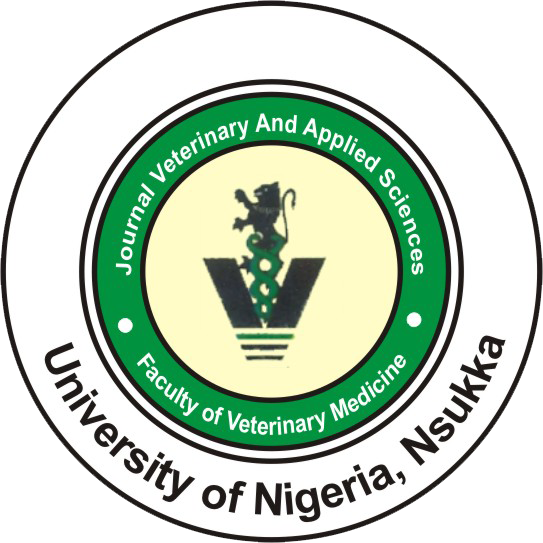University of Nigeria
ISSN: 2315 - 6856
e-ISSN: 2636 - 5553
Journal volumes
Powered by: RockSystems Global Services Ltd.
rocksystemsglobal@gmail.com (+2348035271306)
www.rocksystemsglobal.com
Volume 14, Issue 2: 2024 - Article 168
Abstract
Ticks are arthropod parasites that are known mainly for sucking the blood of their hosts and acting as vectors of disease causing agents in both animals and humans. This study was a preliminary cross sectional survey of tick species that infect goats at Maigatari International Market, Jagawa State, Nigeria, their effects on the goats, and tick control measures adopted by the goat owners and traders. A total of 400 goats of varied breeds, ages and sexes were surveyed at the market in December 2023. The ticks were systematically collected at weekly intervals at the market and identified following standard procedures. One hundred and twenty goat owners and 50 goat traders were interviewed on tick control measures that they adopt. Results showed that out of the 400 goats surveyed, 23 (5.75%) were infested with ticks. Seven (1.7%) of the goats were infested with Argas spp, nine (2.25%) with Hyalomma spp, and another seven (1.7%) with both Hyalomma and Argas spp combined. The breed distribution of goats infested with ticks was: Balami – 6 goats (1.5%), Uda – 5 goats (1.25%), West African Dwarf goats – 2 (0.5%), and Yankasa – 10 (2.5%). Significantly (p < 0.05) higher number of young goats (9.09%) were infested with ticks when compared with adults (5.45%). There was no significant association (p > 0.05) between occurrence of tick infestation and sex (females – 5.03%; males – 6.47%). Observed effects of the ticks on the goats included anaemia, irritation, restlessness, other behavioural changes and skin lesions. Majority (70.6%) of the goat owners and traders used acaricides to control ticks, but a small percentage manually removed the ticks – hand removal 5.88%), used smoke (15.29%) and potash dust (6.8%) for tick control. It was concluded that the occurrence of tick infestation of goats in the sample population was low (5.75%), most probably because a very high proportion of the goat owners/traders use acaricides to control the ticks.
Keywords: Ticks; Occurrence; Goats; Cross-sectional survey; Maigatari International Market; Jagawa State, Nigeria.
How to cite this article:
Yau MS, Kazaure LA, Musa SB, Babalola JB, Adamu N, Abubakar B, Dogara MM, Usman MI, Jatau ID, Jafaru S, Yuguda MU, Gumel AM, Abdullahi IA and Yuguda AU (2024).
Preliminary cross sectional survey of tick species that infect goats at Maigatari International Market, Jigawa State, Nigeria, the effect of the ticks on the goats, and the tick control
measures adopted by the goat owners and traders. Journal of Veterinary and Applied Sciences, 14(2): 820 – 827.
*Correspondence: E-mail: muawiyya2015@gmail.com Phone: -+2347035974782

Preliminary cross sectional survey of tick species that infect goats at Maigatari International Market, Jigawa State, Nigeria, the effect of the ticks on the goats, and the tick control measures adopted by the goat owners and traders
Muawaiyya S. Yau 1, Lawan A. Kazaure 1, Sulaiman B. Musa 1, Joshua B. Babalola 2, Nura Adamu 1, Bello Abubakar 1, M. M. Dogara 2, Muhammad I. Usman 2, Isah D. Jatau 3, Shamsuddeen Jafaru 4, Muhammad U. Yuguda 5, Adamu M. Gumel 6, Isah A. Abdullahi 6, and Amina U. Yuguda 7
1 Department of Animal Health and Production, School of Agriculture, Binyaminu Usman Polytechnic, Hadejia, Jigawa State Nigeria.
2 Department of Biological Sciences, Federal University Dutse, P.M.B 7156, Jigawa State, Nigeria.
3 Department of Veterinary Parasitology and Entomology, Faculty of Veterinary Medicine, Ahmadu Bello University, Zaria, Nigeria.
4 Department of Animal Health and Production, School of Agriculture, Federal Collage of Agricultural Produce Technology, Kano State, Nigeria.
5 Department of Veterinary Pathobiology, Faculty of Veterinary Medicine, Bayero University, Kano, Nigeria.
6 Department of Biological Sciences, Sule Lamido University Kafin Hausa, Jigawa State, Nigeria.
7 Department of Biological Sciences, Abubakar Tafawa Balewa University, Bauchi State, Nigeria.
Download .pdf copy here >>






